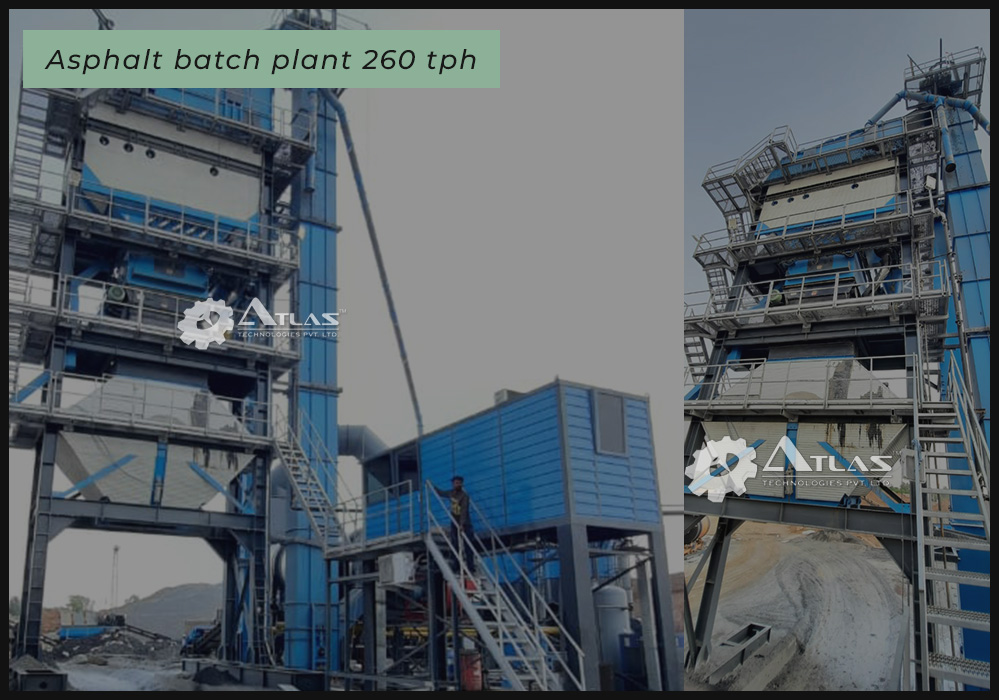An Ultimate Guide – Asphalt Batch Mix Plant Process
Asphalt batch plants are necessary constituents in construction and road maintenance. These plants provide the required material to build and maintain road highways and related infrastructure projects. Asphalt batch plants process involves the creation of hot mix asphalt (HMA) in batches. To produce HMA, these plants use a mix of mechanical and electrical components. In an asphalt batch plant, the aggregates are dried and blended with bitumen and filler using a twin-shaft mixer.
Drum-type continuous mixers are also manufactured by Atlas Technologies, which forms a very strong lineup of our existing wide product lineup. They serve a wide range of customers in India and abroad. We are into manufacturing and exporting a wide range of stationary as well as mobile asphalt drum mix plants.

The Asphalt Batch Plant Process
The asphalt batch plant process has various stages to produce top-quality asphalt. The amount of material produced in one cycle is called a batch. The number of batches produced per hour determines the plant’s production capacity. For example,, a 160 tph plant will have to make 2000 kg . batch per 45 seconds. Have a look at the common process of an asphalt batch plant:
- Aggregate Storage and Heating
- Screening and Storage
- Weighing and Mixing
- Bitumen and filler storage and transportation
- Storage and Loading
- Filtration system
1. Aggregate Storage and Heating
The process starts with storing aggregates like crushed stone, gravel, and sand in cold feed bins, each holding different sizes. The aggregates are then moved to the drying drum.
In the drying drum, aggregates are heated and dried with a burner. This step is crucial because moisture can ruin the final product. The rotating drum ensures the aggregates tumble through the heated air for even heating and drying.
2. Screening and Storage
Once dried, the hot aggregates are sent to a screening unit. The screening unit separates these hot aggregates into different sizes. This entire process makes sure that the aggregates are classified as per the required sizes for the specific asphalt mix design. The separated aggregates are then stored in hot bins. These aggregates are now ready to be weighed and mixed according to the batch recipe.
3. Weighing and Mixing
It is essential to accurately measure each aggregate size for a consistent asphalt mix. The plant’s control system weighs the hot bin aggregates based on the mix design. These weighed aggregates are then dropped into a pug mill mixer, where they are combined with asphalt binder (bitumen) and additives. The mixer’s twin shafts thoroughly blend the materials to create a uniform asphalt mix.
4. Bitumen and filler storage and transportation
Bitumen and filler are stored separately. Bitumen is stored in bitumen tanks. The filler material is reused from the plant’s dust or virgin filler is added into the hot mix asphalt.
5. Storage and Loading
Once the mixing is completed, the hot mix asphalt is temporarily stored in insulated silos. This helps them keep the asphalt at the needed temperature until it gets ready for transportation. These silos make sure that the asphalt remains workable. Finally, the absolute product is then filled into trucks and transported to the road construction site. This is all how asphalt is used for making roads and other surfaces during construction.
6. Filtration system
All modern asphalt batch mix plants come with a bag filter as a filtration device. They are excellent for pollution control and enable the usage of plants under strict environmental conditions.
Essential Components of an Asphalt Batch Plant
Asphalt batch plants can be stationary or mobile. The below list of components applies to stationary as well as mobile asphalt batch plants. The plant capacity can change, and its components can be more or less depending on the end user requirement. However, below is the standard list of components that are offered with the Atlas asphalt batch mix plants.
• Cold Feed Bins are used to store different aggregate sizes.
• A drying drum is used to dry and heat the aggregates.
• The unit helps to separate the heated aggregates into various sizes.
• The weighing system ensures precise measurement of materials.
• Hot bins are used to store the screened and heated aggregates.
• The pug mill mixer mixes the aggregates with the asphalt binder.
• The dust collection system comes in the form of a bag filter equipped with the mixing plant.
• Bitumen storage tanks will store bitumen for use in the asphalt plant. They keep the bitumen in liquid form.
• Filler material is stored in filler silos for use in the hot mix asphalt mixture.
• Storage Silos keep the hot mix asphalt at room temperature until it is sent for transport purposes.
• The control panel houses an important component, the control panel, which is for controlling the whole asphalt plant.
Advantages of Asphalt Batch Plants
There are many advantages to asphalt batch plants. Here is the list of the top ones:
• Flexibility: Asphalt batch plants can produce different asphalt mixes for various project requirements.
• Precision: Its accurate weighing and mixing ensure consistent quality.
• Efficiency: The batching process allows for efficient production with minimal waste.
• Quality Control: It has great control over the production process, resulting in high-quality asphalt.
Wrapping Up
The asphalt batch plant process is key to building roads. These plants heat, dry, weigh, and mix materials with asphalt to create strong, safe road surfaces. Knowing how this works helps us understand the technology and effort behind our transportation systems.
Whether you’re in the field or just interested, the process shows the important work that keeps our roads in good shape. Atlas Technologies is the trusted asphalt batching plant manufacturer in India that prioritizes quality over quantity. To know more, get in touch!
More Resources:
- Comparing Twin Shaft and Reversible Mixer Concrete Plants
- Counter flow asphalt plants – The best in continuous asphalt mix plants
